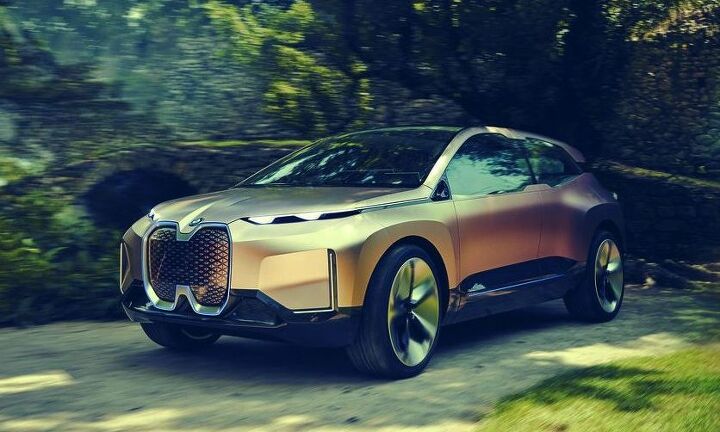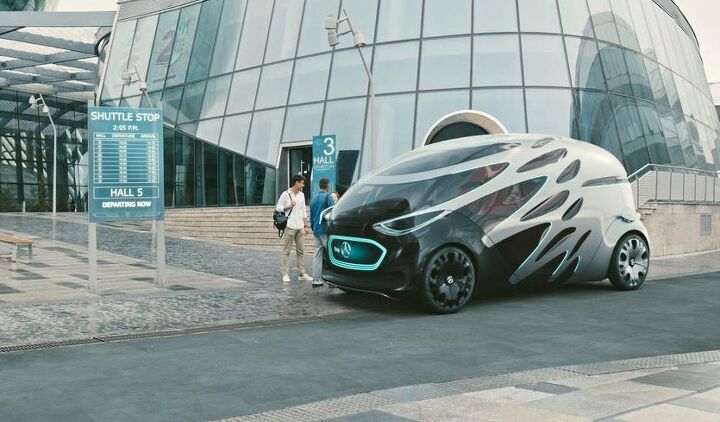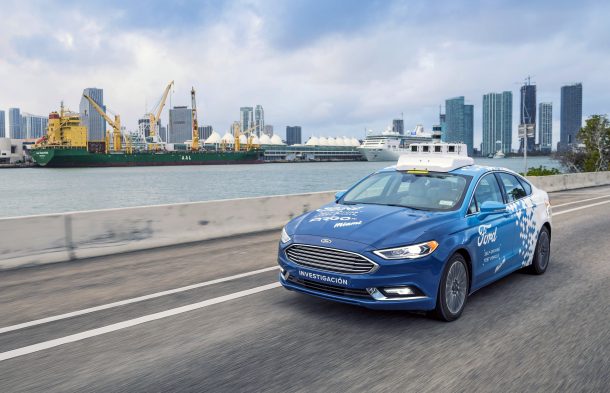#AVs
The Vision INext is BMW's Crystal Ball, Slated for Production in 2021
BMW has showcased the new flagship SUV for the electric i brand. Called the Vision iNext, the vehicle’s aim is to make customers appreciate what’s on the inside — which is important when you’re moving into mobility and out of driving. BMW claims that the model represents the union of vehicular autonomy, connectivity, electrification, and services. It also represents the end of the car as we currently know it.
Don’t confuse the iNext as the death knell of motoring, though. This remains a concept car, not something that you’ll see appearing in your neighbor’s garage in the coming months. Despite promising a production model in 2021, this is still a conceptual exercise — BMW’s attempt at building a crystal ball that allows it to peer into the future. While we’re not going to argue the validity of clairvoyance or scrying, we will suggest that the utility vehicle is probably a more useful forecasting tool than a glass orb and a gut feeling.
Mercedes-Benz's Hideous New Mobility Concept Isn't All That New
On Monday, Mercedes-Benz unveiled the Vision URBANETIC (styled in all caps by the manufacturer) — an all-electric, autonomous nightmare the company claims “answers the questions of future urban mobility.”
The modular design is as versatile as it is ugly. But it’s an important example of the direction automakers are collectively heading. Despite autonomous vehicles being oversold by manufacturers for years, we’re finally reaching a point where they feel comfortable enough to monetize them. Mercedes thinks the Urbanetic will prove revolutionary in redefining our roads. Still, it’s not the newest idea, despite Daimler calling it a “groundbreaking concept.”
Toyota Investing $500 Million Into Uber for Driverless Partnership
Toyota Motor Corp. is set to drop about $500 million into Uber Technologies Inc. under an agreement that will see both companies work jointly on self-driving vehicles. The ultimate goal is for Toyota to bring to market its own autonomous vehicles using some of Uber’s hardware, with direct access to its ride-sharing network.
According to the automaker, the initial push will use the Sienna minivan as a platform for the “Autono-MaaS” (autonomous-mobility as a service) fleet. This makes the arrangement sound very similar to Waymo’s deal with FCA, which allows Alphabet’s autonomous arm to use the Chrysler Pacifica as a test platform for its self-driving hardware in exchange to having improved access to autonomous technology. However, Toyota said the partnership’s primary goal is improving safety and lowering transportation costs for the public.
Public Becoming More Apprehensive About Robotic Cars, Here's Our Best Guess as to Why
A little knowledge is a dangerous thing. Despite the public having become more aware of autonomous vehicles over the last several years, acceptance of the technology appears to be at an all-time low.
According to a recently published survey from Cox Automotive, general knowledge of self-driving cars has grown over the last two years by around 20 percent to 78 percent of a sample audience. However 68 percent of those respondents also felt the technology was potentially unsafe, which represents a nearly 20 percent increase within the same timeframe.
Likewise, general apprehension grew alongside the level of driving autonomy with complete computerized control being the scariest and 84 percent of the sample saying human drivers should always have the ability to take over when they wanted. The public appears to be turning against self-driving vehicles and automakers are going to need to figure out why because these findings are not an isolated incident.
Ford Keen on Ditching the Steering Wheel, Outlines Autonomous Vision
Ford Motor Co. recently released a 44-page report, entitled “ A Matter of Trust,” which clearly states its vision of the autonomous future the tech industry’s attempting to stuff down our collective throats. The file covers Ford’s overall philosophy on self-driving vehicles, a milestone timeline, answers frequently asked questions, and states what the company intends to do over the next couple of years.
While we applaud any automaker that takes the initiative to craft a comprehensive report detailing what they’re plotting, we can’t say we’re enthralled with what we’ve read.
A large portion of the report focuses on giving a general idea of how autonomous vehicles function, what they’ll have to cope with, and answering difficult questions in a frank and honest manner. But Ford also said it intends to launch an AV in 2021 that lacks a steering wheel or pedals. We weren’t happy hearing about General Motors’ development of a car without driver controls back in January and nothing has changed our minds since then.
Autonomous Tech Won't Displace Truckers, Biased Studies Claim
Last year, the Center for Automotive Research said robotic vehicles will eventually displace professional drivers in figures that will be “certainly in the millions.” Meanwhile, Goldman Sachs predicted trucking job losses of 25,000 per month as autonomous vehicles roll out in earnest. Truckers are going to end up like pinsetters and switchboard operators — saddled with a career that have been nullified thanks to automation, until they become extinct. However, we’ve also heard there’s a lack of manpower within the industry and that’s helping spur development.
This year, a glut of new studies emerged that suggest self-driving vehicles will actually benefit truckers. Unfortunately, they all come from sources that really want you to be stoked with the technology.
Uber Killing Off Autonomous Trucking Division
Uber is shutting down its self-driving trucks unit due to a lack of progress and the controversy surrounding its multi-million dollar acquisition of Otto in 2016. The firm was purchased with the intent of developing self-driving cargo haulers, potentially saving the trucking company a fortune by outsourcing driving jobs to robots. But it was slow to reach that goal and ran head-on with a serious distraction almost immediately.
Initially, things looked promising. Otto was famous for engineering a truck that hauled a trailer full of beer across 120 miles of Colorado highway without human intervention. But it found a different sort of fame after its founder, Anthony Levandowski, took over as head of Uber’s self-driving car research and Waymo faulted him with handing over trade secrets.
As a former engineer for Google’s autonomous vehicle project (which would later evolve into Waymo), Levandowski was privy to sensitive information he was later accused of selling as part of the Otto buyout.
Ford Commits $4 Billion to the Future, Creates New AV Subsidiary
Ford Motor Company announced Tuesday that it has formed formed a subsidiary — Ford Autonomous Vehicles LLC — devoted entirely to autonomous vehicle development. That’s probably the catchiest name we’ve heard since Bank of America Corp or Waste Management Inc. However, you don’t need a clever moniker when you’re dumping $4 billion into a project, which Ford intends to do through 2023.
With all the current drama and distrust surrounding self-driving cars, we thought there was a chance automakers would cool off on pushing for it so aggressively. But while some OEMs curbed their futuristic rhetoric ever so slightly, practically everyone else kept the pedal to the metal — an analogy that will lose all meaning once computers drive us everywhere.
Let’s see what The Future™ looks like in and around Dearborn.
Should Police Have the Ability to Track and Disable Self-driving Vehicles?
Autonomous vehicles have created an endless series of unanswerable questions. As the technology continues to advance, decisions on how best to implement it have not. We’ve yet to discern who is liable in the event of an accident, how insurance rules would change, if they can coexist effectively with traditional automobiles, how they will impact vehicle ownership in the long term, and the infrastructure necessary to ensure they’ll function as intended.
There’s also a myriad of security concerns involving everything from the very real prospect of vehicle hacking to automakers selling the personal information of drivers. Both of those topics are about to come to a head as automakers continue shifting toward connected vehicles.
In March, the U.S. Transportation Department met with auto industry leaders, consumer advocacy groups, labor unions, and others in an attempt to navigate the minefield that is autonomous integration. The department previously hosted similar roundtable discussions in December after releasing the new federal guidance for automated driving systems, called “ A Vision for Safety 2.0.” That guidance freed up automakers and tech firms to test self-driving vehicles with fewer regulatory hurdles to cope with.
However, the December report seemed to focus mainly on how little everyone outside the industry understands the new technology.
BMW Rep: Government May Never Allow for Autonomous Cars, Computerized Life and Death Decisions
BMW’s past promises include a pledge to help keep drivers driving in the brave new world of autonomous vehicles. However, it hasn’t entirely sworn off self-driving technology. The company finds itself in a tricky spot, as it’s seen as both a luxury automaker and a performance brand. But it can’t claim to be “The Ultimate Driving Machine” if it doesn’t allow customers to drive.
Automakers and tech firms pushed relentlessly for autonomous driving, making claims that a self-driving nirvana was just around the corner. But current technology proved less than perfect in practice and modern autonomous vehicles require constant human involvement to operate safely, just like any normal car. Despite making strides, the industry seems torn on how to appease everyone.
The government is even more in the dark. While lawmakers initially agreed with industry rhetoric (that autonomy will save lives and usher in a new era of mobility), recent events sparked skepticism. There aren’t many new regulations appearing in the United States, but there also isn’t any clear legislation to help decide who’s held liable when the cars malfunction. A lot of what if questions remain unanswered.
BMW thinks this will be the main reason why autonomous cars fail.
Sink or Swim: What Kind of Automotive Startup Will Byton Be?
After showcasing its first concept vehicle at CES 2018, electric car startup Byton has come back with another for CES Asia. On Monday, the company also announced it had recently raised more than half a billion dollars in capital.
Byton looks to be on the right path, but the trail it’s marching down has already been taken by other EV startups and resulted in failure. For example, Faraday Future drove itself into a brick wall after failing to deliver on its promises for two years straight. It suffered development delays on its prototype, engaged in some sketchy deals, and practically collapsed when its main Chinese backer ran out of money. That isn’t to presume Byton is the same kind of company, but it’s offering the same type of car under vaguely similar circumstances.
Loaded with tech, Byton’s autonomous, all-electric K-Byte sedan and its SUV sibling (the M-Byte) are right in line with every manufacturers’ future vehicle concepts. They’re perpetually connected to the web, capable of self-driving, and chock full of touchscreens. But they aren’t real cars yet, even though the startup suggests they’ll be available for just $45,000 — and relatively soon. The SUV will apparently go into production in 2019, with the sedan following by 2021.
Musk Is Right About the Media, Rocket-powered Roadsters and Tesla Version 9 Edition
Tesla Motors CEO Elon Musk is correct in asserting just how poorly the media covers his company. We know that because, after he tweeted that Version 9 of the company’s software would allow the firm to begin enabling “fully self-driving features,” numerous outlets started claiming complete driving autonomy was just around the corner. We hate to be the bearer of bad news, but that isn’t what’s happening.
To be fair, much of the confusion came via headlines suggesting Musk had explicitly promised a fully self-driving vehicle. While that’s not even close to what he did, we understand that it’s a heading too tempting for many to refuse. We’re betting Elon grasps this concept as well, which is why he chose his wording so carefully. Frankly, the CEO probably comprehends the media far better than the media understands his company, and he regularly uses this to his advantage.
While several outlets clarified that Tesla was actually implementing a software update (with unclear ramifications in the body of their text), plenty glossed over that aspect of the story. Instead, they decided to tack on Musk’s earlier promise that the Tesla Roadster would be offered with a SpaceX package — 10 small rocket thrusters to improve the vehicle’s dynamics.
Super Cruise Coming to Rest of Cadillac in 2020, Conspiracy Theories Coming by 2023
General Motors intends to start offering its hands-free driving system, Super Cruise, across the entire Cadillac lineup by 2020. The technology, already available on the CT6, allows motorists to take a semi-passive role on the highway. Once GM’s luxury brand is sorted, the system will become available on other makes.
If you like the idea of a car that can take you out of the commute a bit and don’t mind the idea of a small camera permanently pointed directly at your face, then this is probably very exciting news.
While Super Cruise is frequently compared to Tesla’s Autopilot, the two operate differently. General Motors’ system does indeed allow for a similar hands-free experience, but the onboard camera tracks the driver’s eyes to ensure they remain relatively attentive to the road ahead. Meanwhile, Autopilot allows drivers to ignore almost everything so long as they’re willing to regain control of the vehicle when asked. The difference between the two is that the onus of safety remains slightly more with the driver with Super Cruise.
Japan's SoftBank Dumps Cash Into America's Autonomous Vehicles, Sets GM Deadline for 2019
Several months after procuring a large ownership stake in Uber, SoftBank has placed $2.5 billion into General Motors’ self-driving program. The automaker intends to begin deploying autonomous vehicles next year and CEO Mary Barra says her company will invest $1.1 billion of its own funds into the effort to ensure the timeline is adhered to.
Thanks to the hefty investment from SoftBank’s Vision Fund, the Japanese holding company now owns roughly 20 percent of General Motors’ tech subsidiary, known as Cruise Automation. While tech firms and automakers have been driving hard to surpass each other in terms of autonomous development for years, GM currently appears to have the most riding on the hardware.
Audi Announces A8 Pricing, but Model Lacks Tech Promised for U.S.
Audi recently announced pricing for the V6-equipped A8, arriving in dealerships this fall for the rock-bottom price of $83,800. Alright, so that’s not exactly chump change, but Audi promised tech that would embarrass practically everything else on the road — including the Mercedes-Benz S-Class.
In some markets, it seems as if the brand will deliver on those promises. The sedan is practically dripping with technology, including the impressive-sounding Traffic Jam Pilot. The system offers a claimed hands-free experience at speeds below 37 mph, as the vehicle can crawl in heavy traffic without the need of a driver. You’ll still need to turn it off and take over in urban environments but, so long as it’s a relatively straight shot, the car will do all the work.
Unfortunately, Audi seemed to have axed its availability for the United States.





























Recent Comments